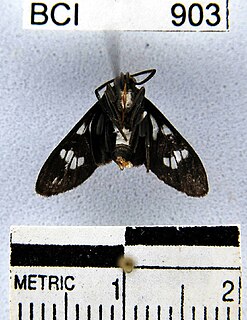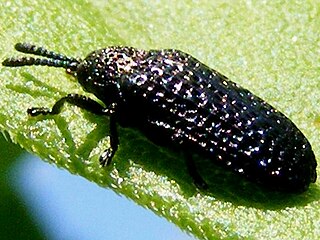
Apatelodidae, the American silkworm moths, is a family of insects in the order Lepidoptera. They are a family within the superfamily Bombycoidea.

Heliura is a genus of moths in the subfamily Arctiinae. The genus was erected by Arthur Gardiner Butler in 1876.

Niphonyx is a monotypic moth genus of the family Noctuidae erected by Shigero Sugi in 1982. Its only species, Niphonyx segregata, the hops angleshade, was first described by Arthur Gardiner Butler in 1878. It is endemic to eastern Asia, including the Russian Far East, the Korean Peninsula, Japan, China and Taiwan. It was introduced to the north-eastern United States in the 1990s and is found from Connecticut south to at least Delaware.

Oraesia is a genus of moths in the family Erebidae. The genus was erected by Achille Guenée in 1852.

Plusiodonta is a genus of moths in the family Erebidae erected by Achille Guenée in 1852.
Nepotilla is a genus of sea snails, marine gastropod mollusks in the family Raphitomidae.

Oraesia emarginata is a species of moth of the family Erebidae first described by Johan Christian Fabricius in 1794. It is found in Australia, New Caledonia, Indonesia, New Guinea, Pakistan, the Philippines, India, Sri Lanka, Sulawesi, Taiwan, China, Japan, Korea and Nepal as well as Eritrea, Ethiopia, Kenya, Namibia, Nigeria, South Africa, Tanzania, the Gambia, Uganda, Oman and Yemen.

Taygetis mermeria, the mermeria wood nymph, is a species of butterfly of the family Nymphalidae. It is found throughout the Neotropical realm from Mexico to Bolivia. The habitat consists of rainforests and cloudforests.
Oraesia pierronii is a species of moth of the family Erebidae first described by Paul Mabille in 1880. It is found on Madagascar and Réunion.
Oraesia triobliqua is a species of moth of the family Erebidae first described by Max Saalmüller in 1880. It is found in northern Madagascar.

Racotis squalida is a species of moth of the family Geometridae first described by Arthur Gardiner Butler in 1878. It is found in central, eastern and southern Africa.

Oraesia cerne is a species of moth of the family Erebidae first described by James Farish Malcolm Fawcett in 1916. It is found in Ghana Ivory Coast, the Democratic Republic of the Congo and Ethiopia.
Oraesia provocans, the provocative calpe, is a moth of the family Erebidae. The species was first described by Francis Walker in 1858. It is found throughout continental Africa, India and Sri Lanka.

Microrhopala is a genus of tortoise beetles and hispines in the family Chrysomelidae. There are about 18 described species in Microrhopala.

Microrhopala excavata is a species of leaf beetle in the family Chrysomelidae. It is found in North America.









